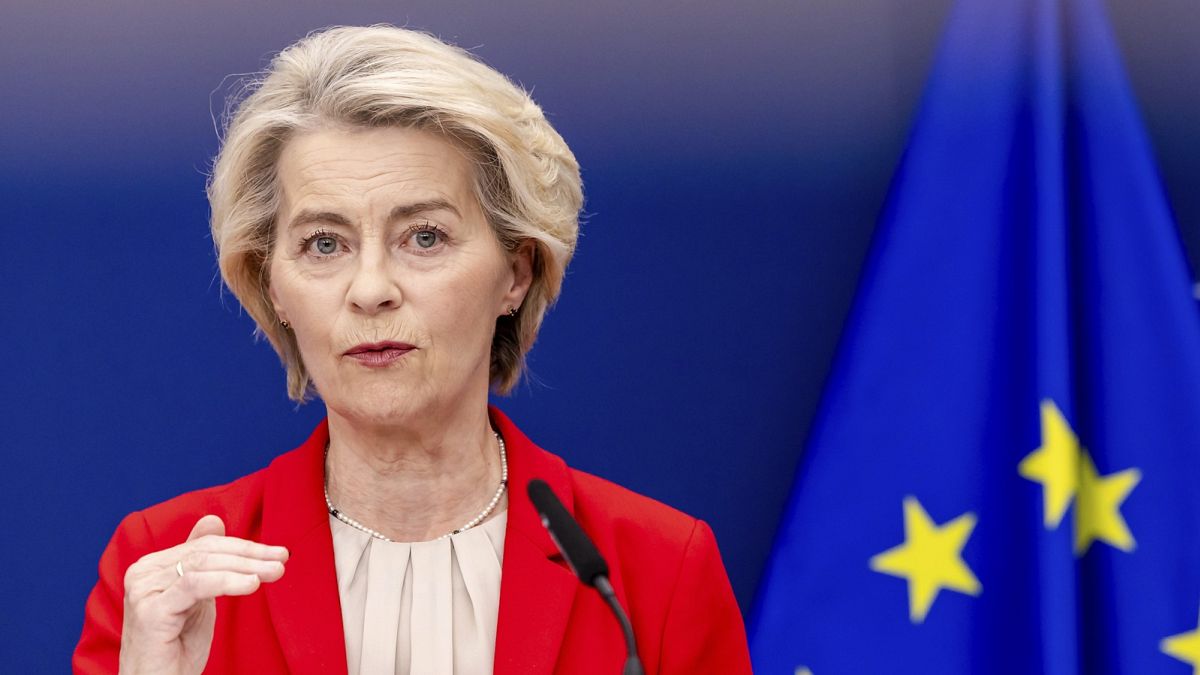Published on •Updated
Ursula von der Leyen has called on Hungary to lift the ban on the Budapest Pride and allow the march, scheduled to take place this weekend, to “go ahead without fear of any criminal or administrative sanctions against the organisers or participants”.
The appeal represents her most direct intervention in the new showdown between the European Commission and Viktor Orbán’s government.
“To the LGBTIQ+ community in Hungary and beyond: I will always be your ally. You have every reason to be proud,” the president of the Commission said in a video message posted on social media on Wednesday evening.
“Europe is stronger and richer because of you. I am on your side. Today and every day.”
In a highly controversial law approved in spring, the Hungarian parliament banned public events considered to be in breach of the Child Protection Act, which heavily restricts depictions of homosexuality and gender reassignment to underage audiences.
The text allows authorities to use facial recognition tools to identify people who organise and attend forbidden events, leading to fines of up to 200,000 Hungarian forints (€485). If not paid, the penalties can be collected as taxes.
Based on the law, police later banned the celebration of Budapest Pride because it would take place “in the presence of persons under 18 years of age”. The government suggested it could be alternatively held in an enclosed location, like a stadium.
The liberal mayor of Budapest, Gergely Karacsony, struck a defiant tone and announced the celebration of an umbrella event called “Day of Freedom” to bypass the prohibition.
“Budapest city hall will organise the Budapest Pride march as a local event on 28 June. Period,” Karacsony said last week.
In her message, von der Leyen joined the cause, expressing her “full support and solidarity” to Hungary’s LGBTIQ+ community.
“In Europe, marching for your rights is a fundamental freedom. You have the right to love who you want to love and be exactly who you are,” she said.
“Our Union is one of equality and non-discrimination. These are our core values, enshrined in our treaties. They must be respected at all times, in all member states.”
Orbán, who leads a self-described “illiberal” government and regularly engages in culture wars, replied almost immediately to her video.
“Dear Madam President, I urge the European Commission to refrain from interfering in the law enforcement affairs of Member States, where it has no role to play,” he said.
“I also call on the Commission to focus its efforts on the pressing challenges facing the European Union—areas where it does have a clear role and responsibility, and where it has made serious mistakes in recent years, such as the energy crisis and the erosion of European competitiveness.”
Von der Leyen and Orbán are set to meet on Thursday for an EU summit in Brussels.
The Commission has not yet announced legal action against Hungary but is analysing the elements of the new law, which touch upon various aspects. (The Child Protection Act is the subject of a separate case that has reached the European Court of Justice.)
Besides possible breaches of fundamental rights, the ban is also under scrutiny for its potential incompatibility with the Artificial Intelligence Act, which lays out strict limitations on how law enforcement can deploy facial recognition.
Due to the headline-making controversy surrounding the ban, the Budapest Pride is expected to attract a record number of international visitors to the Hungarian capital.
Hadja Lahbib, the European Commissioner for Equality, and a delegation of over 70 members of the European Parliament also plan to attend.
This article has been updated with more information.
Read the full article here


